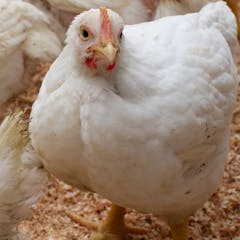
Articles on Meat
Displaying 1 - 20 of 176 articles

Meat from sheep that graze in South Africa’s Karoo and France’s Mont Saint-Michel lamb is deemed special.

A sustainable food system starts with a fairer corporate structure. It won’t simply come from a shift in consumer habits during Veganuary’s push for people to eat a more plant-based diet. Here’s why.

As the plant-based campaign celebrates its tenth anniversary, researchers are analysing how Veganuary could be having a substantial impact on British diets.

A new law has been introduced that officially brings dog meat to an end as a commodity in South Korea.

Labels highlighting the health and pandemic risks of meat were also effective.

Let’s just call it something different.

The UK and EU moved in lockstep over edible insect regulation until Brexit, but that has changed in recent years.

Food prices are rising and around half of Australians are trying to cut back on their grocery bill. So how can you save on the cost of meat and dairy products without skimping on nutrients?

Too much red meat – and especially processed meat – is linked to cancer and heart disease. But moderation is the key – alongside better farming practices

Cell cultures are common tools in biology and drug development. Bringing them up to scale to meet the meat needs of societies will require further development.

Tracking data suggests individual chickens have very different movement patterns.

The Supreme Court has upheld a controversial California law requiring pork sold in-state to be humanely raised, no matter where it’s produced. Pork producers say it could drive up food prices.

There are arguments over the future of red deer on the Scottish island of South Uist but archaeological expertise can help people live alongside wild animals.

Stopping the production of lab-grown food will be bad news for the environment.

Most food in Australia remains free of PFAS, but a new study has found it can build up in cattle on PFAS-affected farms. But there are ways to manage the land and livestock to reduce the risks.

Tangible solutions would reduce livestock methane emissions, while also improving productivity and livelihoods.

Official estimates indicate that meat consumption is falling in the UK – but not all of the data agrees.

You may have heard about the “carnivore diet”, which, as you can imagine, is made up mostly of meat. Here’s why a balanced diet is a better idea.

Pork producers are challenging a California law that animal welfare advocates call the most important measure for farm animal protection in decades.

Healthier and more sustainable food could be made cheaper as meat and dairy becomes more expensive.
